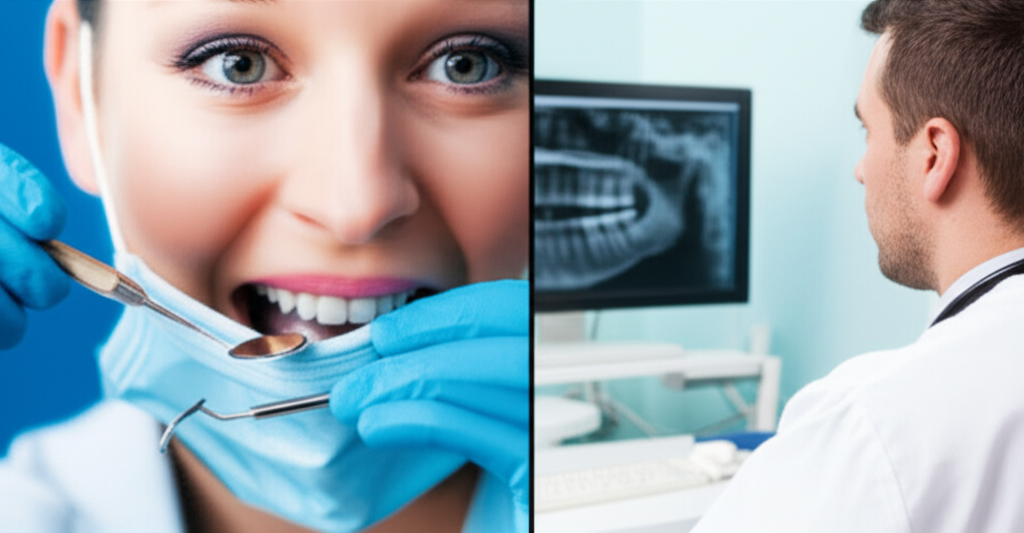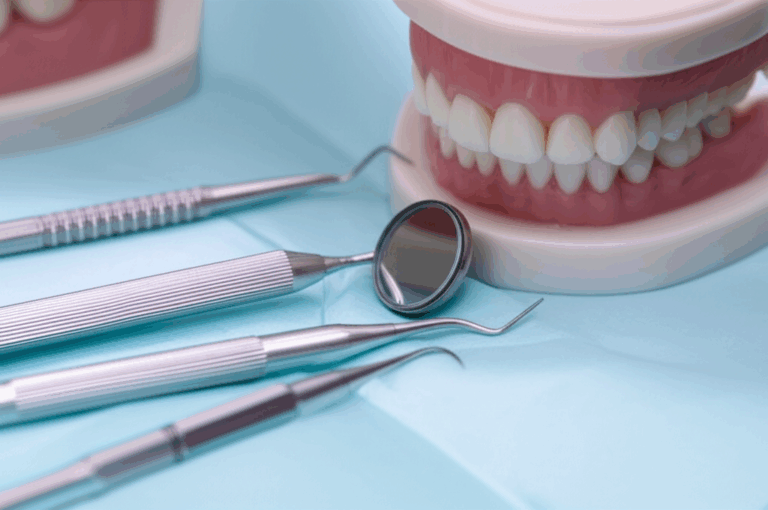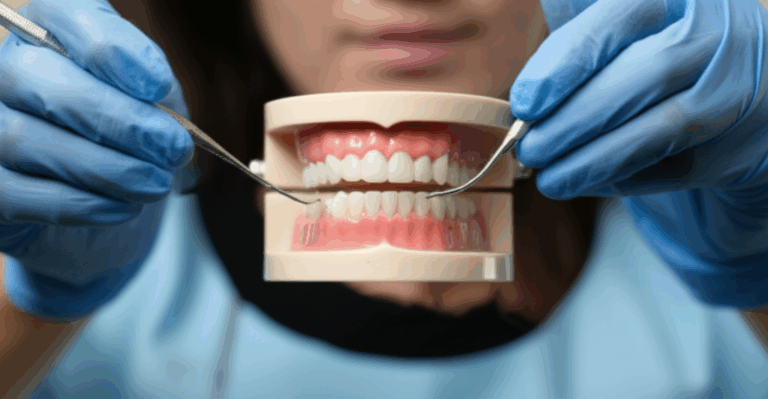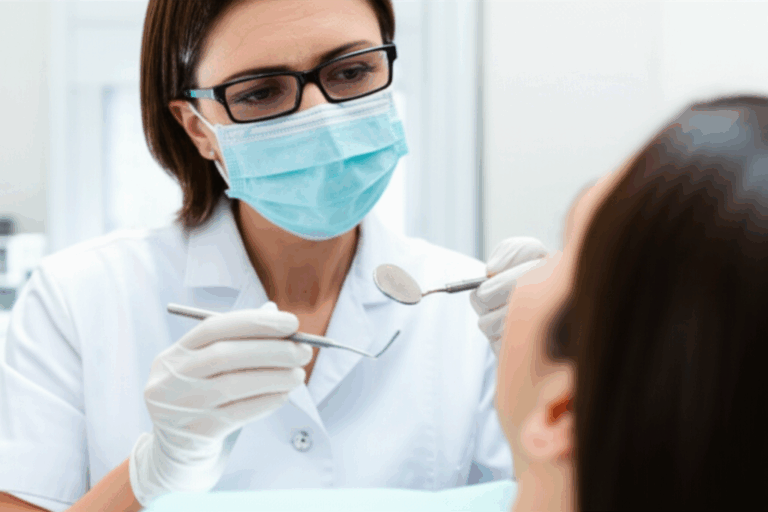
Is a Dentist a Medical Doctor? The Definitive Answer
Ever sat in the dentist’s chair and wondered, “Is my dentist a real doctor?” Maybe you’ve looked at the degrees on the wall—DDS, DMD—and felt a little puzzled. You’re not alone. Whether you’re a patient trying to figure out your healthcare team, a student planning your future, or just curious, this is a question many people ask. And it’s important! Because knowing your healthcare providers helps you make better choices for your health.
So, let’s take a look at what dentists do, how they train, and how their work fits into the bigger world of medicine. We’ll clear up any confusion and give you the facts you need to feel good about visiting the dentist.
In This Article
- The Short Answer: A Doctor of Oral Health, Not a Physician
- The “Doctor” Title: Why Dentists Use It
- Educational Paths: Dentistry vs. General Medicine
- Scope of Practice: What Dentists and Doctors Do
- Overlapping Roles and Teamwork
- Licensing, Degrees, and Professional Standing
- FAQ: Common Questions About Dentists and Doctors
- Your Healthy Takeaway
The Short Answer: A Doctor of Oral Health, Not a Physician
Let’s get straight to the point.
Is a dentist a medical doctor?
No, not in the usual way we think of doctors—like family doctors or heart doctors. Dentists are not MDs (Doctor of Medicine) or DOs (Doctor of Osteopathic Medicine). Instead, they are doctors with special degrees in dental surgery (DDS) or dental medicine (DMD). Their main work is with the mouth—your teeth, gums, jaw, and everything around them.
Think of it like this: if your body was a house, physicians look after the whole thing, inside and out. Dentists are the experts who focus on keeping the kitchen in top shape. Both are important, but they have different training and tools.
Quick Comparison:
- Dentist: Doctoral degree (DDS/DMD), expert in oral health, not a physician
- Physician: Doctoral degree (MD/DO), expert in body health, treats all body systems
Still, dentists ARE doctors—just not “medical doctors” as most people think. They go through tough training, do complex work, and often find problems that can affect more than just your mouth.
The “Doctor” Title: Why Dentists Use It
Why do dentists call themselves “doctor”? Good question. In healthcare, the “Doctor” title isn’t just for medical doctors. It means someone has gone through a lot of education and training, and can give special care.
Dentists earn a DDS (Doctor of Dental Surgery) or a DMD (Doctor of Dental Medicine). These two degrees are the same—just different names depending on the school.
When your dentist calls themselves “Doctor,” it’s not to brag. It shows they are in charge of your care, able to diagnose and treat problems, and have worked hard for years to get there.
Dentists are not the only ones who do this—pharmacists, optometrists, veterinarians, chiropractors, and others also use the “Doctor” title. What matters is what they studied and what problems they fix.
Educational Paths: Dentistry vs. General Medicine
Let’s compare how dentists and physicians train. Many questions about “doctor” status begin here.
Dental School: Oral Health Training
To be a dentist, you need:
- Undergrad degree: Usually 4 years, often science-based
- Dental school: 4 years, become a DDS or DMD
- Optional residency: 1-7 years for those who want to do a specialty (like braces, oral surgery, or kids’ teeth)
What do dental students learn?
Dental school isn’t only about cleaning teeth. The classes are hard. Students learn:
- Mouth anatomy (teeth, gums, jaws, etc.)
- Diseases that affect the mouth (cavities, gum disease, cancer)
- Medicines used in dentistry
- Dental procedures (crowns, implants, surgeries)
- X-rays for teeth
- How to handle tough cases, pain, and emergencies
After all this, someone with a dental degree has spent years learning to spot and fix mouth problems.
Medical School: Whole Body Training
Doctors take a similar but broader path:
- Undergrad: 4 years (mostly science classes)
- Medical school: 4 years (MD or DO degree)
- Residency: 3-7+ years, depending on what type of doctor they want to be
Med students learn about the whole human body—heart, lungs, brain, skin, and everything else. They handle illnesses from sore throats to heart attacks. Afterward, they do a long residency in their chosen specialty—things like skin, heart, brain, or surgery.
Key Difference
Dentists focus early and go deep. Doctors start broad and then pick a specialty. Imagine two cooks: one is a pastry chef (dentist), the other runs the whole kitchen (doctor). Both have tough jobs, but do different things day-to-day.
Summary:
- Dentists and doctors both go through many years of study.
- Dentists focus on mouths, jaws, and how they connect to the rest of the body.
- Doctors focus on the entire body and how all the parts work together.
Scope of Practice: What Dentists and Doctors Do
Now let’s see what each one handles on a daily basis.
Dentists: The Mouth Experts
Dentists know everything about your teeth, gums, jaw, and mouth. They:
- Find, prevent, and treat tooth and gum diseases
- Fix teeth with fillings, crowns, bridges, and implants
- Pull teeth, even tough wisdom teeth
- Straighten teeth (braces)
- Treat jaw problems (like popping and pain)
- Do root canals, place implants, do surgeries inside the mouth
Dentists do a lot more than just “clean teeth.” They fix pain, dissolve infections, and help you eat, talk, and smile without trouble.
There are dental labs that help dentists make your new teeth or crowns fit perfectly.
Medical Doctors: The Whole-Body Team
Doctors look after your whole body. Examples:
- Manage long-term illnesses (like diabetes or high blood pressure)
- Treat infections (like flu or pneumonia)
- Do surgeries or deal with serious injuries
- Help with mental health
- Give you checkups, shots, and cancer tests
Doctors focus on everything, while dentists focus on the head and neck area.
Overlapping Roles and Teamwork
Dentists and doctors often need to work together. Sometimes, the line between their jobs is unclear.
Oral and Maxillofacial Surgeons: A Foot in Both Worlds
Some specialists, called oral and maxillofacial surgeons (OMFS), get both a dental and a medical degree. They finish dental school, then do 4-6 years of surgery training, and sometimes also finish medical school. They take care of:
- Bad face and jaw injuries
- Tough wisdom tooth removals
- Rebuilding part of the mouth or face
- Tumors or growths in the mouth or jaw
Oral Medicine Dentists: Spotting Big Health Problems
Some illnesses first appear in your mouth—like diabetes or HIV. Oral medicine dentists are specially trained to spot these signs.
The Mouth-Body Connection
You can’t separate your mouth from the rest of your body. Studies show a link between oral health and overall health. For example:
- Gum disease may make diabetes worse
- Mouth infections can raise your risk for heart problems
- Some medicines doctors give (like blood thinners) affect dental work
It’s best when your dentist and doctor work together.
Licensing, Degrees, and Professional Standing
Here’s another common question: who lets dentists and doctors treat you, and what do those letters after their names really mean?
Different Boards, Different Jobs
Both need strict licenses, but separate groups handle them:
- Dentists: State dental boards
- Doctors: State medical boards
Both must pass national tests (NBDE for dentists, USMLE for doctors), get certified, and keep learning.
What Do the Letters Mean?
- DDS: Doctor of Dental Surgery
- DMD: Doctor of Dental Medicine (same as DDS)
- MD: Doctor of Medicine
- DO: Doctor of Osteopathic Medicine
All require a lot of study, training, and testing. Yes, your dentist is just as highly trained in oral health as a doctor is in general medicine.
Scope of Dental Specialties and the Dental Team
Dentistry is not one-size-fits-all. There are many specialties, like:
- Braces Specialist (Orthodontist): Straightens teeth
- Gum Specialist (Periodontist): Treats gum disease
- Root Canal Specialist (Endodontist): Fixes problems inside teeth
- Tooth Replacement Specialist (Prosthodontist): Makes crowns, bridges, dentures
- Kids’ Dentist (Pediatric Dentist): Works with children
- Oral Disease Specialist (Oral Pathologist): Catches things like cancer
Each specialty means more years of training. Dentists work with a team: hygienists (who clean teeth), assistants, and lab workers in places like a dental ceramics lab or labs that make crowns.
Educational & Professional Comparison: Fast Facts
Here’s a simple chart to compare:
| Feature | Dentist (DDS/DMD) | Medical Doctor (MD/DO) |
|---|---|---|
| Primary Degree | DDS or DMD | MD or DO |
| Duration | 4 yrs undergrad + 4 yrs dental school | 4 yrs undergrad + 4 yrs med school |
| Residency | Optional/needed for some specialties (1-7 yrs) | Needed for all types (3-7+ yrs) |
| Focus | Mouth, teeth, jaws, oral tissues | Whole human body |
| Licensing Board | State dental boards | State medical boards |
| National Exams | NBDE, INDBE | USMLE Steps 1–3 |
| Main Organization | American Dental Association (ADA) | American Medical Association (AMA) |
| Daily Work | Cleanings, fillings, crowns, root canals, implants | Checkups, treatments, surgery, emergency care |
| US Workforce | About 204,000 dentists (ADA 2021) | About 1.05 million doctors (AAMC 2021) |
FAQ: Common Questions About Dentists and Doctors
Do dentists go to medical school?
No, they attend dental school. It’s just as tough, but all about oral health. If they want to do oral surgery, they might also go to medical school.
Can dentists write prescriptions?
Yes. Dentists can give out antibiotics, pain meds, and others for mouth problems.
What’s the difference between DDS and DMD?
None. Both mean you finished dental school. The name depends on which dental school you attend.
Are oral surgeons medical doctors?
Some are. A few oral surgeons get both dental and medical degrees, but most just have a dental degree with lots of surgery training.
Why do dentists use the title “Doctor”?
Because they have a doctoral degree and are responsible for your health, like veterinarians or pharmacists.
How Dentists Fit Into the Healthcare System
Dentists are important in healthcare—sometimes, they see big health problems before anyone else does. For example, some diseases first appear in your mouth. Dentists help with pain, let you eat and talk normally, and boost your confidence with a nice smile.
They keep up with new ideas and tools, sometimes working alongside skilled china dental labs to give you the best results. Your mouth health is part of your whole health.
The Guide: What You Can Do to Get the Care You Need
What You Can Do at Home:
- Brush and floss daily: It helps stop gum disease and cavities.
- Eat healthy foods: Keeps teeth and gums strong.
- Drink water: Helps avoid dry mouth and tooth decay.
- Check your mouth: Watch for sores or lumps that don’t heal.
When to See a Dentist:
- Pain: Teeth or jaw pain that won’t go away
- Bleeding or swollen gums: Signs of gum disease
- Broken or chipped teeth: Should be fixed quickly
- Sores: Any mouth sore that lasts more than 2 weeks
How to Pick a Dentist
Find a licensed dentist with good reviews and proper training. For special treatments, your dentist can send you to a specialist. Don’t be afraid to ask about their experience. Whether you need a checkup or a crown made by a zirconia lab, you deserve great care.
Who Is This Info For? (The Good Candidate Section)
- Patients: If you’re not sure who is handling your care, this guide is for you.
- Students: If you’re thinking about dental or medical school, it’s good to know the differences.
- Caregivers: Understanding the roles helps you care for family.
- Medical and dental workers: Good teamwork gives patients better care.
If you’re considering something like veneers or dental implants, talk to your dentist about if you’re a good fit and what comes next. Some dental offices use special labs, like veneer labs, to ensure top-notch results.
Your Healthy Takeaway (The Empowering Conclusion)
Here’s the bottom line:
- Dentists are doctors who specialize in mouth health, not physicians.
- Their schooling is long, tough, and hands-on—like medical school.
- Dentists know how to check, treat, and prevent dental problems, improving your life.
- The “Doctor” title means real training and trust.
- Oral health affects body health; dentists and doctors often work together.
- Dental checkups are more than “just cleanings”—they help your whole body stay healthy.
Next step:
Take charge of your health—get dental checkups and talk to your healthcare team. Whether it’s your teeth, gums, or more, your providers are your helpers for better health.
Remember: Your dentist cares about more than your smile—they care about YOU. Got more questions? Call the office, ask away, and don’t be afraid to get a second opinion.
Here’s to a healthy mouth and a healthier you!
For more info, see the American Dental Association, American Medical Association, and CDC Oral Health pages.
Reviewed by a licensed dental professional. For learning only; ask your own provider for advice for you.








